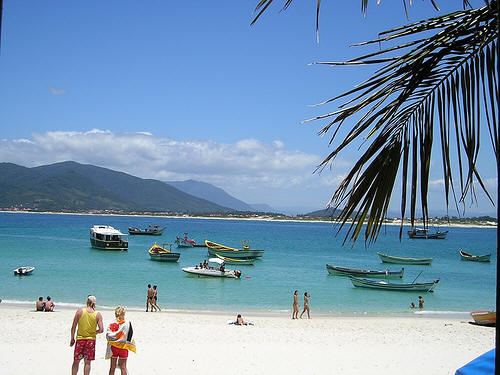Berlin - Rio de Janeiro's Copacabana beach first comes to mind when people envision Brazil or perhaps the sprawling favelas around the big cities.
The world's fifth largest country, regularly criticized for doing too little to stop deforestation, has hardly stood out as a leader in ecotourism.
But that's about to change, said Marcelo Pedroso, director of the Brazilian tourism board Embratur. Speaking at this month's ITB international travel trade show in Berlin, Pedroso said, "We want to promote ecotourism more."
At present, those who wish to experience Brazil's natural attractions, in their original state, have to invest plenty of time and money. What exactly is ecotourism Brazilian-style, and how environmentally friendly is it?
Giselle Beyer Tho, who works for the German travel agency Gateway Brazil, noted that tourists often had to fly hundreds of kilometres to reach remote natural paradises. For Brazilians, ecotourism often meant simply experiencing nature, not sustainable and environmentally friendly travel, she said.
Beyer Tho said encounters with Brazil's wilderness generally took place on excursions into the rain forest from one of the jungle lodges around Manaus, capital of the Brazilian state of Amazonas. But tourists, who had hoped to see animals, often returned disappointed because animals were hardly visible in the dense foliage, she remarked.
Conditions for wildlife spotting were much better in the Pantanal wetlands of south-western Brazil. After the rainy season, when the savannah is flooded, boat-borne tourists can observe capybaras - a large rodent - caimans, monkeys and various tropical bird species.
One lodge even guarantees that its guests will see jaguars on their outings, Beyer Tho said. However, Brazil's only true eco-lodges were near Tefe, a small city in the heart of the jungle about a hour's flight from Manaus.
Embratur's Pedroso also pointed to the floating bungalows on the Amazon River near Tefe as exemplary. They use solar power, collect rainwater and filter wastewater, he said.
What's more, they have a social purpose: "We want to involve the local population so that people have an alternative to hunting, fishing, and slash-and-burn agriculture."
While many tourists head to Brazil for its long sandy beaches, classic destinations such as Rio de Janeiro, Iguazu Falls, Salvador de Bahia and Sao Paulo still top the list.
Seeing these sights alone keeps tourists occupied for a good three weeks because of the country's size - and as "they want to lie on the beach for a few days at the end of their holiday to absorb what they've seen," remarked Gateway Brazil's Markus Meinhold. He said eco-lodges were mainly for tourists staying four weeks and longer or those on a second visit.
Second-timers might see what is probably Brazil's most exclusive ecotourism spot: the Fernando de Noronha archipelago, in the Atlantic Ocean some 500 kilometres from the coastal city of Recife. The marine national park has been a UNESCO World Heritage site since 2001.
With a little luck, divers in the park could seer turtles and dolphins, Beyer Tho said. But she pointed out that only 420 tourists were allowed onto the main island at any one time.









